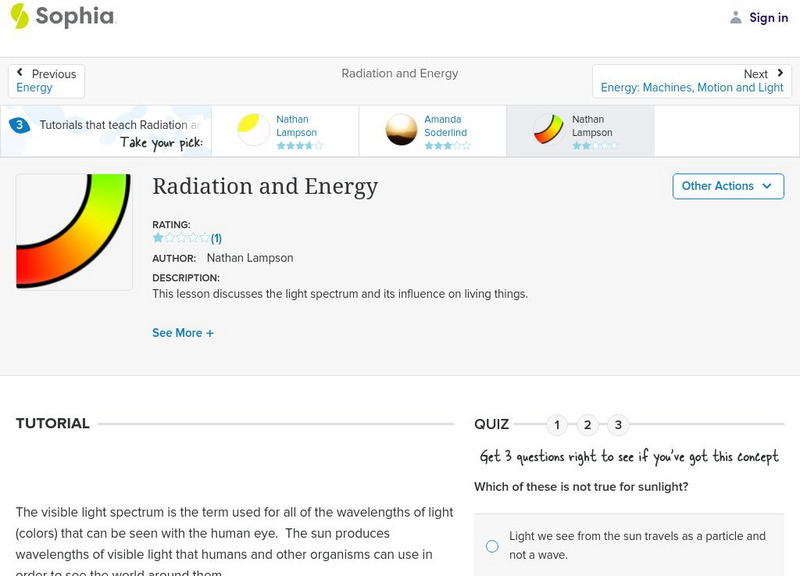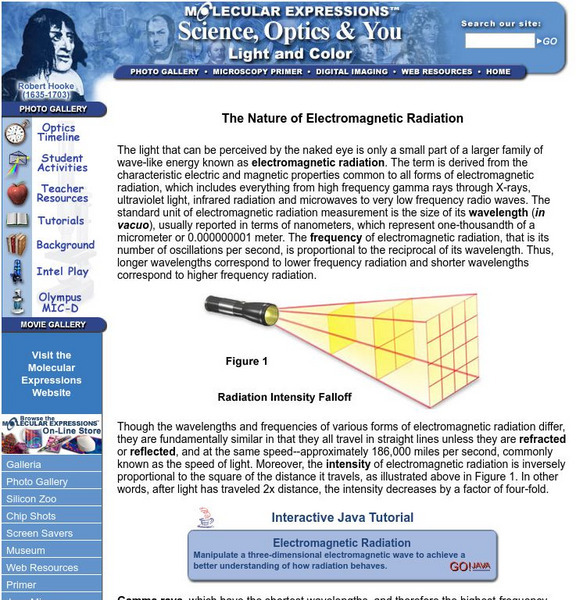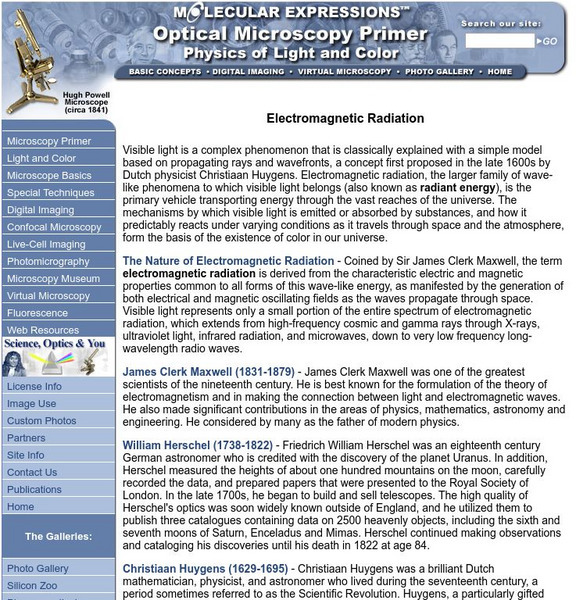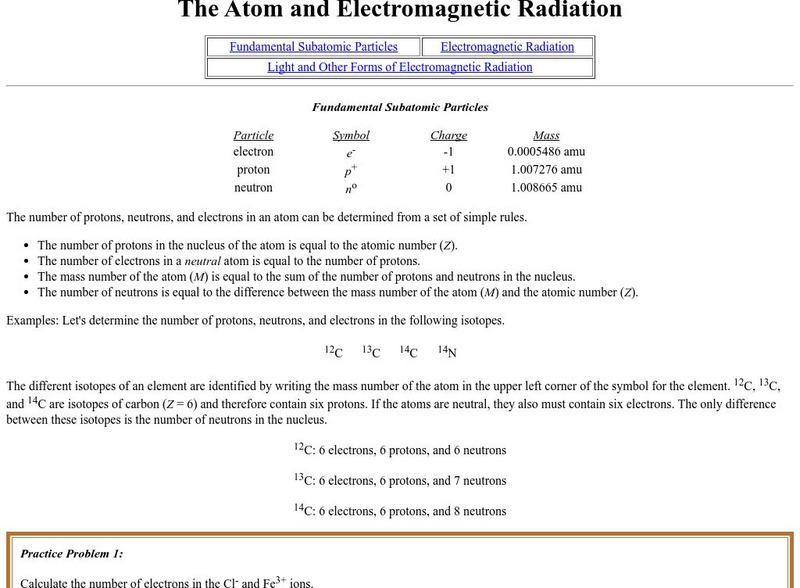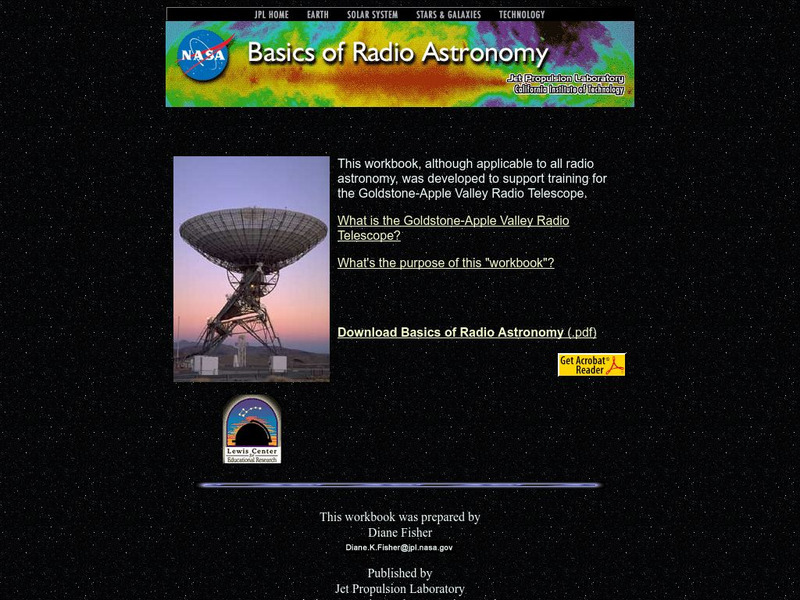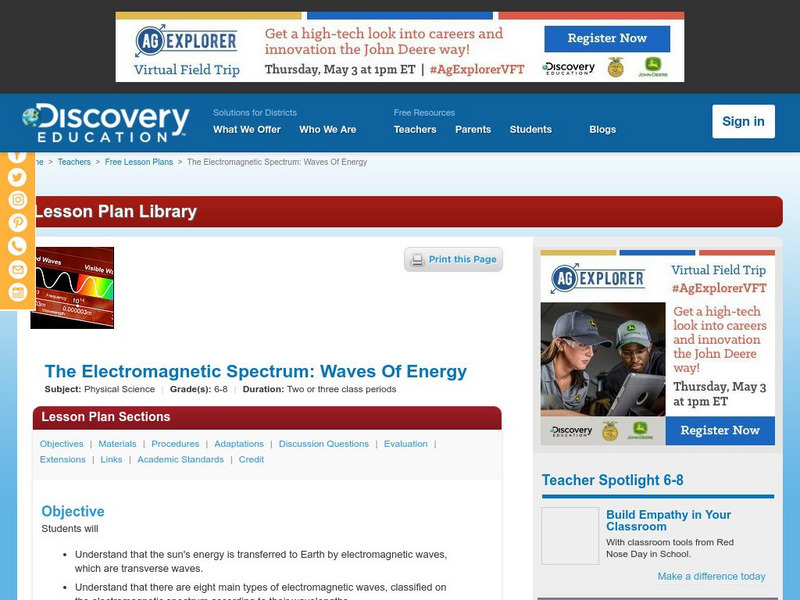Read Works
Read Works: Electromagnetic Radiation
[Free Registration/Login Required] An informational text about electromagnetic radiation and the effects it creates. A question sheet is available to help students build skills in reading comprehension.
Libre Text
Libre Texts: Physics: Electromagnetic Waves
Utilize this wiki-type page created by students and faculty members to gain a higher understanding of the electromagnetic waves. Study the equations to comprehend how different variables can affect characteristics of wavelengths.
CK-12 Foundation
Ck 12: Earth Science: Electromagnetic Energy in the Atmosphere
[Free Registration/Login may be required to access all resource tools.] Overview of electromagnetic radiation.
CK-12 Foundation
Ck 12: Physical Science: Electromagnetic Spectrum
[Free Registration/Login may be required to access all resource tools.] Covers electromagnetic radiation and its properties, and the electromagnetic spectrum.
Idaho State University
Idaho State University: Radiation and Risk
An overview of the health risks associated with radiation exposure.
NASA
Nasa: Mission: Science: Electromagnetic Spectrum: Infrared Waves
Infrared light lies between the visible and microwave portions of the electromagnetic spectrum. Infrared light has a range of wavelengths, just like visible light has wavelengths that range from red light to violet.
Sophia Learning
Sophia: Radiation and Energy
A brief introduction to the nature of the sun's electromagnetic radiation. [25 secs]
American Geosciences Institute
American Geosciences Institute: Solar Energy: Background
A reference page on solar energy. Learn about solar energy, solar heating, solar radiation, and electromagnetic radiation. The page also describes the advantages and disadvantages to solar energy.
Florida State University
Florida State University: Basic Electromagnetic Wave Properties
This Florida State University page includes an interactive java tutorial that explores the relationship between frequency, wavelength, and energy, and enables the visitor to adjust the intensity of the radiation and to set the wave into...
Florida State University
Florida State University: Nature of Electromagnetic Radiation
This site from The Florida State University provides an informational page on electromagnetic radiation discusses the characteristics and properties of its many forms including X-rays, gamma rays, ultraviolet radiation, infrared...
Florida State University
Florida State University: Molecular Expressions: Electromagnetic Radiation
This Florida State University page introduces light as an electromagnetic wave and discusses the frequency and wavelength range of the various regions of the electromagnetic spectrum. Includes links to some interactive Java applets.
NASA
Nasa: Electromagnetic Spectrum: Radio Waves
Radio waves have the longest wavelengths in the electromagnetic spectrum. This NASA article discusses AM, FM, TV, cell phone, as well as radio astronomy, which all use this technology.
Purdue University
Purdue University: Fundamental Subatomic Particles
At this site from the Purdue University, the elementary subatomic particles are described and electromagnetic radiation is detailed. Includes learning exercises and answers.
Other
Global Change: Mobile Phone Radiation
A video of Patrick Dixon explaining the possible dangers of radiation from mobile phones and a list of recent findings related to the controversy over whether or not mobile phone radiation causes damage to the brain, thereby increasing...
CK-12 Foundation
Ck 12: Earth Science: Solar Energy on Earth
[Free Registration/Login may be required to access all resource tools.] Describes characteristics of solar energy including the electromagnetic spectrum and movement.
NASA
Nasa: Basics of Radio Astronomy
Site developed by NASA to support training at the Goldstone-Apple Valley Radio Telescope. A manual in PDF format that covers everything from the basics of electromagnetic spectrum through radio sources through mapping the sky in the...
Science Struck
Science Struck: What Is a Bolometer and What Is It Used For?
A bolometer is an instrument used to measure radiant energy. Learn about its history, its advantages, how it works, some different types, and its important applications.
Famous Scientists
Famous Scientists: Wilhelm Rontgen
A short biography about the scientist who produced and detected electromagnetic radiation in a wavelength range known as X-rays or Rontgen rays, which earned him the first Nobel Prize in Physics in 1901.
Discovery Education
Discovery Education: The Em Spectrum: Waves of Energy
Students are introduced to the electromagnetic spectrum through this group research activity. Each group investigates a different wavelength range within the em spectrum and reports back to class. Discussion ideas also included.
Other
Fluorescent Mineral Society: The Ultraviolet Spectrum
This resource presents a discussion of the nature and properties of ultraviolet light. The manner in which minerals emit UV light is described and explained.
PBS
Pbs Nova: Dirty Bomb: Sources of Radiation
In this interactive, learn about sources of both beneficial and harmful radiation which exist in many forms all around us.
CK-12 Foundation
Ck 12: Physical Science: Electromagnetic Waves
[Free Registration/Login may be required to access all resource tools.] Provides the definition of an electromagnetic wave, electromagnetic radiation, and electric and magnetic fields. Also discusses how electromagnetic waves begin,...
CK-12 Foundation
Ck 12: Earth Science: Telescopes Study Guide
[Free Registration/Login may be required to access all resource tools.] This study guide summarizes key points about electromagnetic radiation and the different types of telescopes that rely on various forms of it. Includes a few...
Alabama Learning Exchange
Alex: Understanding Solar Energy. Part 1
This lesson discusses how electromagnetic radiation transfer the sun's energy to earth. This lesson will also talk about the eight types of electromagnetic waves in the electromagnetic spectrum and how each type is used or found in our...








